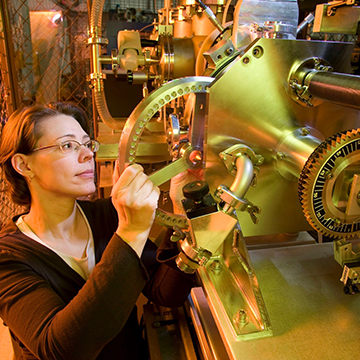The Center for Accelerator Mass Spectrometry (CAMS) uses unique and state-of-the-art instrumentation to perform ultrasensitive isotope ratio measurements and ion beam analysis that address a broad spectrum of scientific needs to meet the Laboratory’s missions.
Accelerator mass spectrometry is a sensitive technique for measuring isotope ratios such as carbon-14 relative to carbon-12 or -13. AMS and ion beam analytical techniques have diverse applications. Scientists use them to measure the age of archaeological artifacts, and to reconstruct ancient climates, and the seismology of ancient earthquakes (geochronology). These techniques are also useful for studying ground water hydrogeology, carbon-cycle dynamics, oceanic and atmospheric chemistry, and the bioavailability and metabolism of chemicals, toxic compounds, and nutrients. CAMS has assisted scientists in performing forensic reconstruction of radiation doses at Hiroshima and Chernobyl; detecting signatures of nuclear fuel reprocessing for nonproliferation; and making nuclear physics cross-section measurements and nuclear chemistry studies.
CAMS houses an HVEC 10 MV Model FN accelerator, the most productive in the world, producing 25,000 analyses a year for a suite of isotopes. The 1 MV AMS system is the principal analytical tool for biomedical carbon-14 research. The third instrument is an ion beam analysis system based around a NEC 5SDH-2 1.7-MV accelerator. This instrument is used for materials characterization, environmental and biomedical research, nuclear physics, and national security applications. Collectively, these instruments provide an unmatched set of accelerator-based analytical capabilities.

The Center for Accelerator Mass Spectrometry performs ultrasensitive isotope ratio measurements and ion beam analysis

